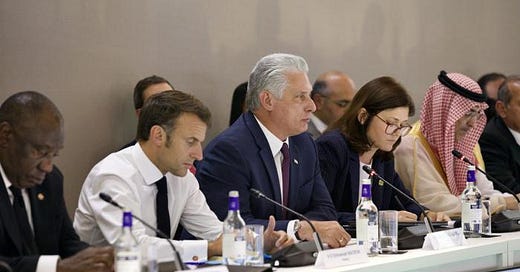Cuban President Miguel Díaz-Canel addressed on June 22, 2023, the Summit for a New Global Financing Pact, held in Paris, France. He spoke from the vantage point of the global South; in that Cuba this year has been elected to serve as Chair of the G-77 and China. He expressed the hope that the Summit would be “a new starting point towards a more comprehensive intergovernmental discussion and decision-making process within the framework of the United Nations.”
Díaz-Canel condemned the current international economic and financial order.
“I will not be disclosing any secret if I affirm that the most nefarious consequences of the current international economic and financial order, which is profoundly unjust, antidemocratic, speculative, and exclusionary, are affecting especially the developing nations. . . . Our peoples neither can nor should continue being the laboratory for colonial formulas and renewed forms of domination that use the debt, the current international financia…



